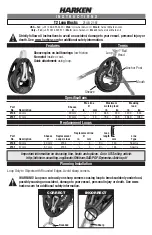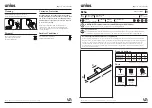
��������������������������������
�����������������
�����������
FEATURES
•
Converts unbalanced line-level signals to balanced mic-level output
•
Provides signal and impedance matching for the direct connection
of instruments to amplifiers and mixers
•
1/4" Input jacks for connecting instrument or speaker-level signals
(switch selectable)
•
1/4" Thru jack allows the unbalanced signal to be sent to an
onstage amplifier while the balanced signal is sent to a mixer
•
Ground Lift switch helps eliminate hum and buzz problems in
musical instrument hookups
•
Allows use of long cables without high-frequency loss
•
The DB-1A can be powered either internally by two 9-volt batteries
or externally by phantom power from a mixer
•
The DB-1P passive model has a noise filter for reducing buzz and
hiss (switch selectable)
DB-1A
INPUT
THRU
OUT
IN
POWER
SPKR
PKUP
LINE
GND
LIFT
1
3
2
4
5
6
1. INPUT
— Connect the signal source to this 1/4" unbalanced TS jack.
2. POWER LED
— Indicates when the power is on. When powered
from the internal batteries, it lights when a signal is plugged into the
INPUT jack. When powered from a mixer's phantom power, it lights
as long as the phantom power is applied.
3. THRU
— This 1/4" unbalanced TS jack is in parallel with the INPUT
jack and provides a “Thru” connection of the input signal for
sending to an amplifier onstage.
4. PKUP/LINE
— Move this switch to the left when connecting an
instrument with a passive pickup, like an electric guitar. Move this
switch to the right when connecting a line-level signal to the input.
5. SPKR
— When connecting a speaker-level signal (for example, from
a guitar amplifier’s speaker output), move this switch to the right
(IN).
6. GND/LIFT
— This switch makes or breaks the input ground to pin 1
of the XLR output jack. When the switch is to the left, the ground
is connected, and when the switch is to the right, the ground is
disconnected (LIFTED).
7. OUTPUT
— This balanced XLR jack provides a low-impedance
mic-level signal for connecting to a microphone input on a mixer. If
the mixer has phantom power, it can be used to power the DB-1A.
Power automatically switches away from the internal batteries to
save battery life.
Pin 1 = Ground
Pin 2 = Hot (+) and in-phase with the input signal
Pin 3 = Cold (–)
OUTPUT
7
TO INSTALL OR CHANGE THE BATTERIES:
1. Using a small phillips screwdriver, remove the four screws on each
side and the two screws on the bottom of the DB-1A as shown in
Figure 1.
2. Slide the tray out of the cover.
3. Install two 9-volt batteries into the battery clips and slide the
batteries into the retaining bracket as shown.
4. Reassemble the DB-1A.
CAUTION: Do not use longer screws than the original
screws provided. Longer screws will short out the
circuit board and void the warranty.
Figure 1
1






















